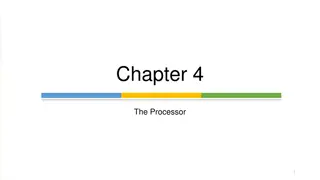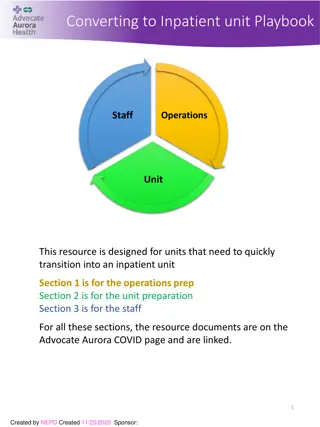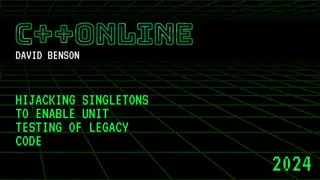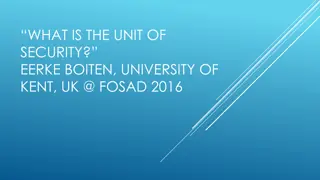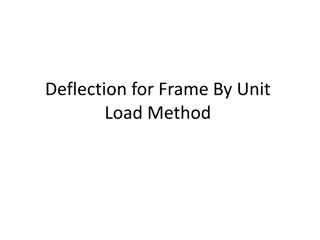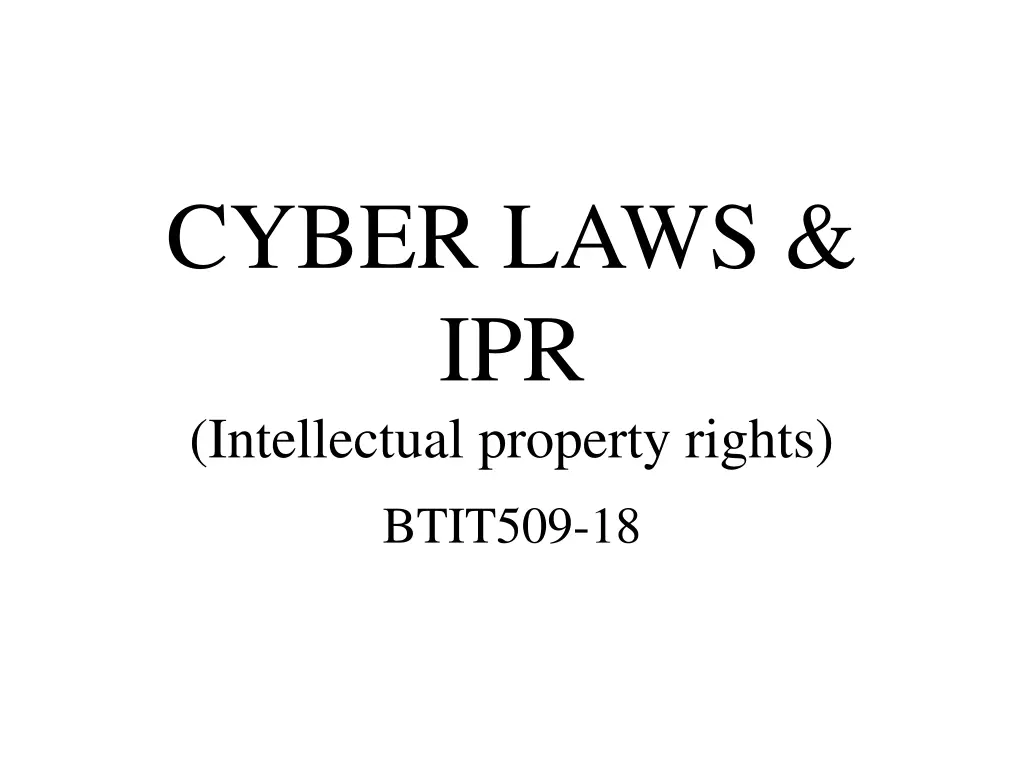
Cyber Laws and Intellectual Property Rights Overview
Explore the key aspects of the Information Technology Act, 2000, including the legal validity of electronic contracts, digital signatures, and the establishment of regulatory bodies. Learn about the objectives and features of the act to facilitate electronic transactions and data storage while ensuring legal recognition and security measures.
Download Presentation

Please find below an Image/Link to download the presentation.
The content on the website is provided AS IS for your information and personal use only. It may not be sold, licensed, or shared on other websites without obtaining consent from the author. If you encounter any issues during the download, it is possible that the publisher has removed the file from their server.
You are allowed to download the files provided on this website for personal or commercial use, subject to the condition that they are used lawfully. All files are the property of their respective owners.
The content on the website is provided AS IS for your information and personal use only. It may not be sold, licensed, or shared on other websites without obtaining consent from the author.
E N D
Presentation Transcript
CYBER LAWS & IPR (Intellectual property rights) BTIT509-18
Information Technology Act, 2000 In 1996, the United Nations Commission on International Trade Law (UNCITRAL) adopted the model law on electronic commerce) to bring uniformity in the law in different countries. The General Assembly Nations recommended that all countries must consider this model law before making changes to their own laws. India became the 12th country to enable cyber law after it passed the Information Technology Act, 2000. commerce (e- of the United
Salient Features of The Information Technology Act, 2000 All electronic contracts made through secure electronic channels are legally valid. Legal recognition for digital signatures. Security measures for electronic records and also digital signatures are in place A procedure for the appointment of adjudicating officers for holding inquiries under theAct is finalized Provision for establishing a Cyber Regulatory Appellant Tribunal under the Act. Further, this tribunal will handle all appeals made against the order of the Controller or Adjudicating Officer. Provisions for the constitution of a Cyber Regulations Advisory Committee to advise the Central Government and Controller.
An appeal against the order of the Cyber Appellant Tribunal is possible only in the High Court Digital Signatures will cryptosystem and also a hash function Provision for the appointment of the Controller of Certifying Authorities (CCA) to license and regulate the working of Certifying Authorities. The Controller to act as a repository of all digital signatures. The Act applies to offences or contraventions committed outside India Senior police officers and other officers can enter any public place and search and arrest without warrant use an asymmetric
Objectives of the Act Grant legal recognition to all transactions done via electronic exchange of data or other electronic means of communication or e- commerce, in place of the earlier paper-based method of communication. Give legal recognition to digital signatures for the authentication of any information or matters requiring legal authentication Facilitate the electronic filing of documents with Government departments agencies and also
Facilitate the electronic storage of data Give legal sanction and also facilitate the electronic transfer of funds between banks and financial institutions Grant legal recognition to bankers under the Evidence Act, 1891 and the Reserve Bank of India Act, 1934, for keeping the books of accounts in electronic form.
Applicability According to Section 1 (2), the Act extends to the whole country that conjointly includes Jammu and the geographic region as the Act uses Article 253 of the constitution. Section 1 (2) at the side of Section 75 specifies that the Act applies to any offence or dispute committed outside India yet. If the conduct of personnel constituting the offence involves a laptop or a processed system or network settled in India, then no matter his/her position, the person is punishable underneath theAct. Lack of international cooperation is the sole limitation of this provision.
Non-Applicability According to Section 1 (4) of the knowledge Technology Act, 2000, theAct doesn t apply to the subsequent documents: Execution of instrument underneath Negotiable Instruments Act, 1881, except cheques. Execution of influence of professional underneath the Powers of professionalAct, 1882. Creation of Trust underneath the Indian TrustAct, 1882. Execution of a can underneath the Indian Succession Act, 1925 as well as the other legal document disposition by no matter name known as. Stepping into a contract for the sale or conveyance of immovable property or any interest in such property. Any such category of documents or transactions as is also notified by the Central Government within the Gazette.
Application of The Information Technology Act, 2000 Nothing in The Information Technology Act, 2000 shall apply to documents or transactions specified in the First Schedule: Provided that the Central Government may, by notification in the Official Gazette, amend the First Schedule by way of addition or deletion of entries thereto. Every notification issued shall be laid before each House of Parliament.
Following are the documents or transactions to which the Act shall not apply Negotiable Instrument(Other than a cheque) as defined in The Negotiable Instruments Act, 1881; Apower-of-attorney as defined in The Powers of Attorney Act, 1882; Atrust as defined in The Indian Trusts Act, 1882;
Awill as defined in The Indian Succession Act, 1925 including any other testamentary disposition; Any contract for the sale or conveyance of immovable property or any interest in such property; Any such class of documents or transactions as maybe notified by the Central Government.
Amendments Brought in The Information Technology Act, 2000 The Information Technology Act, 2000 has brought amendment in four statutes vide section 91-94. These changes have been provided in schedule 1-4. The first schedule contains the amendments in the Penal Code. It has widened the scope of the term document to bring within its ambit electronic documents. The second schedule deals with amendments to the India Evidence Act. It pertains to the inclusion of electronic document in the definition of evidence.
The third schedule amends the Bankers Books Evidence Act. This amendment brings about change in the definition of Banker s-book . It includes printouts of data stored in a floppy, disc, tape or any other form of electromagnetic data storage device. Similar change has been brought about in the expression Certified- copy to include such printouts within its purview.
The fourth schedule amends the Reserve Bank of India Act. It pertains to the regulation of fund transfer through electronic means between the banks or between the banks and other financial institution. A major amendment was made in 2008. Amendment introduced the Section 66A which penalized sending of offensive messages . It also introduced the Section 69, which gave authorities the power of interception or monitoring or decryption of any information through any computer resource .
It also introduced penalties for child porn, cyber terrorism and voyeurism. Amendment was passed on 22 December 2008 without any debate in Lok Sabha. The next day it was passed by the Rajya Sabha. It was signed by the then President (Pratibha Patil) on 5 February 2009.
Objectives of the knowledge Technology Act, 2000? The primary objectives of the ITAct, 2000 are: Granting legal recognition to any or all transactions is done through electronic information suggests that of transmission or e-commerce intact of the sooner paper-based communication. By providing legal recognition to digital signatures for the authentication of any data authentication. Facilitating the electronic filing of documents with totally different Government departments and conjointly agencies. Facilitating the electronic storage of information. exchange, alternative or matters requiring
Jurisdiction The word jurisdiction is derived from Latin juris-dictio meaning the saying or speaking of the law . It indicates the value, validity and articulation . The concept of jurisdiction of a court emanates from the Sovereignty theory and Territorial Theory of State. The authority of a court to hear a case and resolve a dispute involving person, property and subject matter is referred as the jurisdiction of that court. It is the legislative function of the Government to enact administrative function to enforce those laws. laws and judicial and/or
Thus, the principles of jurisdiction followed by a State must not exceed the limits which international law places upon its jurisdiction. Jurisdiction is the authority of a court to hear a case and resolve a dispute involving person, property and subject matter. These principles of jurisdiction are enshrined in the constitution of a State and part of its jurisdictional sovereignty. All sovereign independent States possess jurisdiction over all persons and things within its territorial limits and all causes, civil and criminal, arising within these limits.
Types of Jurisdiction includes: Generally there Legislative, Enforcement and Adjudicative Jurisdiction. Jurisdiction to legislate is the right of a State to prescribe the normative standards for the regulation of its subjects. However the State has to take into consideration the limitation of international law in the exercise of jurisdiction in cases that involve non territory entities. The prescriptive jurisdiction of state is not unlimited as the State would not like to prescribe a conduct for the enforcement of which there is no basis in the practical aspect. are three kind of jurisdiction i.e.
In fact unlimited power of prescription measures will seriously undermine the sovereign authority of the other State . As per the international customary norms the State is obliged not to interfere in any form or for any reason whatsoever in the internal and external affairs of other State. Therefore generally State territoriality or effects doctrine and the legislative power of the State. adopts the principle of


